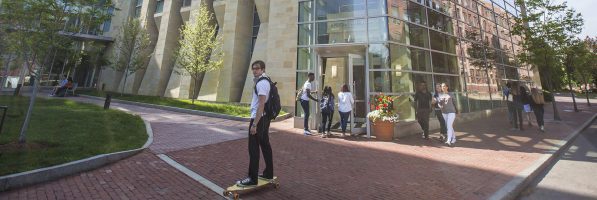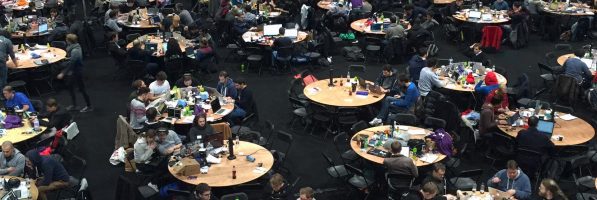How To Create Your Own Internship, and More – Boston News

Let’s explore some of the most interesting stories that have emerged from Boston business schools this week.
How to Land an Internship That Doesn’t Exist Yet – D’Amore-McKim Blog
The D’Amore-McKim School of Business at Northeastern University recently published an account of how Matheus Dos Santos, DMSB ’19 created his own internship at Brazilian bank branch Banco Bradesco.
Dos Santos, a Brazilian native, sought out an internship at Banco Bradesco as an opportunity to “learn more about the industry” while he spent his summer back home in between his first and second years at D’Amore-McKim.
Dos Santos reports, “When I was talking to them about a summer job, they didn’t have any process in place. They weren’t sure at first how to hire me formally, and since I’ve started, all sorts of people have come up to me to say that I’m the first one the bank has hired for this kind of position.”

AP Photo via Victor R. Caivano
Dos Santos helped Banco Bradesco “develop an online trading platform to reach millennials.” Edilson Fontenele, head of customer experience at Bradesco and Dos Santos’ supervisor, writes that Dos Santos’ appeal was his unique perspective as a “millennial who knows the Brazilian environment and also had exposure to international markets.”
You can read the full article here.
The Big Leap – Sawyer Business Blog
Sawyer Business School student Jennifer Wiens writes candidly about the precise moment she decided to transform her life and career. After being laid off from her job at a Seattle biotech company, Wiens chose to move cross-country to Boston in part to “go where the jobs were” but also because she thought Sawyer “could help me capture that sense of control in my career.”
Wiens simultaneously began her Sawyer EMBA and a stint as Charles River Labs’ global product manager where she coordinated “multiple teams and meeting with clients all around the world.” She writes about how the two fed into each other.
“Because of my Suffolk experience, I don’t feel like I’m out of my element. I’m explaining business concepts to people who’ve been in business for 20 years. I’m teaching them current approaches to certain things.”
Then Wiens pulled another 180 by leaving the Charles Rivers Lab gig. As part of her EMBA capstone course, she created a business strategy and marketing plan for Advanced Dental Sleep Medicine, which offers “alternative, non-surgical ways to reduce sleep apnea.” According to the article, both of which worked so well that the “owner convinced her to leave Charles River Labs and come work for him [as] full-time employee number three.”
Wiens writes, “The company’s gotten a lot of good buzz, so the business is poised to explode and franchise out. And that’s where I come in.”
You can check out the full article here.
3 Steps Toward Safer and Sounder Software – MIT Sloan Newsroom
Deutsche Bank CIO and head of safety and soundness Frédéric Véron recently gave a talk at the MIT Sloan CIO Symposium, where he shared 3 pieces of wisdom for making software “safe and sound.”
Véron said “safe and sound” software is about a “mix of hyper-awareness, good planning and foresight, and learning quickly from mistakes.”
According to the article, “hyper-awareness” involves knowing “how all your software is actually being used day-to-day, ensuring all stakeholders in development understand the full scope of the product, and continuously taking baseline metrics to understand what can be considered normal operating conditions for a system.”
Good planning and foresight entails that “all of the different procedures that will be necessary to maintain the system in production mode need to be thought through ahead of time. You can always bolt it all on later, but it will cost you more money and it won’t be native or work as well.”
Véron advocates “failing and adapting fast” by adopting agile and DevOps. “The whole point of agile is about adopting the philosophy where you break down major efforts into smaller efforts, allowing you to do incremental releases so that you can make a small change, and if it isn’t working you can pull it out of production quickly without impacting the whole thing.”
He elaborated, “Safety and soundness is about ‘How do we make the enterprise safer and more sound, right from the get-go?’ Not just when things happen, but before things happen.”
The full article can be found here.
MIT Breaks Down Starbucks Response to Recent PR Nightmare, and More – Boston News

Let’s explore some of the most interesting stories that have emerged from Boston business schools this week.
What Starbucks Got Wrong—and Right—After Philadelphia Arrests – MIT Sloan Newsroom
Following Starbucks’ PR nightmare this past April in which an employee at a Philadelphia Starbucks had two African American patrons arrested after while they waited to conduct a business meeting, Starbucks announced it will host an afternoon of racial bias training for 175,000 employees across 8,000 of its locations.
MIT Sloan senior lecturer Roberta Pittore commended the coffee giant on the sincere response it made following the initial clumsy attempt to address the controversy in a generalized statement.
Regardless of the potential impacts a single afternoon of racial bias training might have on its employees, Pittore believes that “something is better than nothing, more is better than less, and sooner is better than later. I think what it does achieve from Starbucks’ point of view is that it changes the discussion from ‘What did our employee do that was offensive,’ to ‘How can we learn and how can we change?’”
You can read professor Pittore’s entire take on the incident and the Starbucks response here.
Two Northeastern Students Created an App to Revolutionize the School Bus Industry – D’Amore-McKim Blog
The Best Buy-sponsored E-Fest recently awarded $40,000 to BusRight, an app current D’Amore-McKim School of Business students Keith Corso, ’21, and Evan Eddleston, ’22, co-founded to “revolutionize the school bus industry.”
BusRight is designed to “track school bus passengers, current location, calculate optimal travel routes, curb carbon emissions, reduce transportation costs for bus companies, and improve quality of life for passengers, parents, and bus drivers.” According to the article, many school administrators and bus company officials have expressed interest in using the app.
Eddleston writes, “Bus drivers are home earlier, students are home earlier, and parents know where their kids are. It’s a much more efficient system than the one in place today.”
You can read more about BusRight here.
“Be Unreasonable” – Sawyer Business Blog
The keynote speaker at the Sawyer Business School 2018 commencement was Boston Foundation president and CEO Paul S. Grogan who received an honorary doctorate and shared some refreshing words of wisdom drawn from a lifetime of devotion to the betterment of communities.
“Powerful interests conspire to keep things the way they are. They’re fiercely resistant to change because they benefit from the status quo. [There is a] need for courageous public servants who can stand up to pressure and citizen activists who can reshape public opinion in their communities.”

Boston Foundation president and CEO Paul S. Grogan, speaking at this month’s Sawyer Business School commencement / Photo via suffolk.edu
Grogan advised graduates to think beyond the material success their prestigious degree will help them attain. “I implore you to volunteer, to vote, to donate to charity … but moreover to be an active citizen and fight for your fellow neighbors who don’t enjoy the full promise of an American life.”
You can read more highlights from Grogan’s lecture here and watch his speech in its entirety below.
MIT Hackathon Yields Planned Parenthood for Substance Abuse – Boston News

Let’s explore some of the most interesting stories that have emerged from Boston business schools this week.
Planned Parenthood for Substance Abuse Idea Wins MIT Enterprise Management Lab Hackathon – MIT Sloan Newsroom
MIT Sloan’s 2018 Enterprise Management Lab hackathon recently came and went. This year’s winning concept applied Planned Parenthood’s business model to substance abuse in an attempt to creatively address the ongoing American opioid crisis.
The idea extended substance treatment to include support for friends and family and offer “a one-stop shop for information” to “government entities, nonprofits, hospitals, and rehab clinics.” Kyle R. Chapman, MBA ’19, and member of the winning team, writes:
“We knew a lot of people would try to solve the problem by going upstream. A smart pillbox might address part of the opioid crisis, but the problem is that’s only attacking one point of a really systemic problem.”
Learn more about this year’s hackathon winner here.
Trending Topics in Marketing and Media – Sawyer Business Blog
Sawyer Business School at Suffolk University recently recapped its recent Bridging the Gap seminar, which offered a platform for Boston marketing and media pros to highlight a number of key industry issues for students, including the impact of data privacy on digital advertising; voice-activated devices; and strategies for building brands in the modern era.
Ereni Markos, associate professor of marketing and co-organizer of the event, writes:
“It’s especially important for all of us in the Marketing Department to bring real-world expertise to the Suffolk community and, in turn, for us to share our thinking from the classroom and working with students. Networking is crucial for students to build their professional network early on in their careers.”
You can read more about the seminar here.
Lessons from Tim Ryan ’88 of PwC – Babson Blog
Babson College recently hosted a guest lecture from Senior Partner and Chairman of PwC US Tim Ryan ‘88, who used his talk to highlight three key bits of advice that touched upon respect, reputation, and recognition. He also spoke extensively with the Babson blog after his appearance about what diversity and inclusion means to him.
“If we don’t truly understand one another, we’ll never be the most inclusive workplace in the world. Outside of family, work is where we spend the most amount of our time. It was a catalytic moment, after over a decade of investing in programs, trainings, studies, and testing, when we realized that the baseline of talking and communicating was missed.”
Read more from Babson’s talk with Tim Ryan here.
The Boston vs. Washington DC Full-Time MBA Battle

Choosing the right city for your MBA program can be a bigger choice than it seems: given the connections and opportunities an MBA typically provides, the city where you pursue your degree will likely be the same city where your career begins and grows.
Even if you’ve narrowed down your business school search to the east coast, you’ve still got a number of top metros to choose from. So regardless if you’re looking south to Washington, D.C., or north to Boston, both metros will likely offer a number of benefits for up-and-coming business professionals.
Both D.C. and Boston offer a number of exceptional full-time MBA programs, giving a prospective MBA a lot to think about. Below, we’ll break down some of the biggest differences in location, programs, and job placement for each metro.
Location
As long as you can deal with snow, Boston is a multicultural hub of business that covers a variety of industries, from startups to high tech and the creative economy. Massachusetts is home to 30 Fortune 500 companies, with massive corporations like General Electric and Liberty Insurance Group centered within Boston. However, as the city continues to grow and improve, the cost of living is also climbing, with Boston ranking eight overall as the most expensive city in the United States.
If you are looking to use your business acumen in a government setting, there are few places better to go than the nation’s capital. With fifteen companies making the Fortune 500 list in the Washington DC metro area, there are a number of opportunities for MBAs to put their business skill to work, even outside of government agencies, with companies like Wal-Mart and Exxon Mobile leading the list. However, DC even outranks Boston for cost of living, ranking as the third most expensive city in the United States.
Washington Full-Time MBA Programs
The Washington DC metro has more than 35 higher education institutions with post-bachelor programs for business students. Featuring some of the top ranked MBA programs in the country, many of the DC programs focus on professional integrity and ethics, attempting to reflect its location in the country’s capital. Many of the MBA programs here also focus on placing business within a global context, encouraging students to gain real-world experience outside of the classroom to gain a better understanding of the global business community.
Full-Time MBA Programs in DC Include:
- George Mason University School of Business
- George Washington University School of Business
- Kogod School of Business – American University
- University of Maryland R.H. Smith School of Business
Boston Full-Time MBA Programs
The Boston metro features some of the top ranked and oldest business schools in the world, which focus on placing students within the global economy and encouraging study abroad opportunities that allow students to get hands-on experience in international business. Given Boston’s reputation as a growing business hub, many of the top jobs in the city may require an MBA.
Full-Time MBA Programs in Boston include:
- Sloan School of Management – MIT
- Harvard Business School
- Questrom School of Business – Boston University
- Sawyer Business School – Suffolk University
- Carroll School of Management – Boston College
Cost of MBA Programs
Cost can be an important consideration when choosing a degree program. The average tuition costs of the Washington DC programs mentioned above is roughly $82,090, though the number may be slightly less for local students. In Boston, the range may be slightly higher. Harvard Business School can cost up to $122,000 per year, but other quality programs in the Boston metro can also be found as low as $91,040.
Job Placement and Salary
The cost one is willing to spend on an MBA is often largely determined by the potential salary that can be made after obtaining the degree. Given that both Boston and DC are among the U.S. cities with the highest cost of living, salary may be an important determination in selecting a city to start your career. Thankfully, both cities offer the chance for high earning potential. According to PayScale, Boston MBA graduates can earn anywhere from $53,725 on average to $173,940. In Washington DC, where there is a slightly higher cost of living, salaries can range from $58,402 to $147,715.
